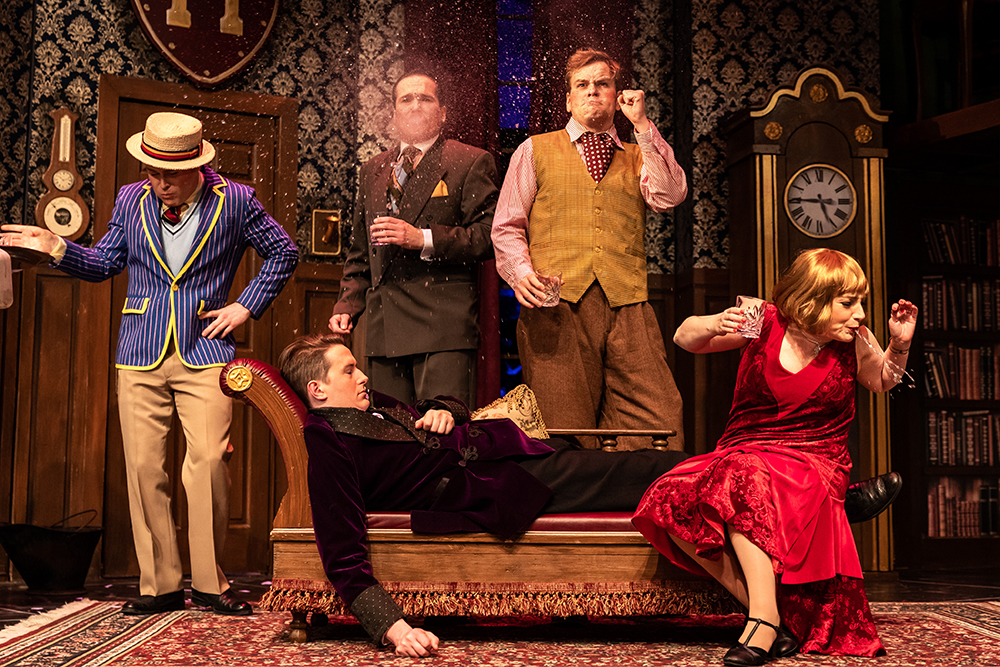The Murder at Haversham Manor was a complete and utter travesty. Viewing this play was akin to viewing a slow-motion train wreck. Actors forgot their lines, were replaced mid-show by stagehands (and at one point, believe it or not, a prop), and by the end of the night, the set had completely fallen apart! However, The Play That Goes Wrong, the show that encompassed The Murder at Haversham Manor, went off without a hitch.
One of my favorite tropes in theater — or any storytelling format, really — is a play within a play. It is always a joy to watch the layers of an actor playing the role of an actor playing a role. Theatre Memphis’ The Play That Goes Wrong adds another element to this gambit: Nearly every component of a play that you can think of “fails” in this show within a show.
The Murder at Haversham Manor, and subsequently, The Play That Goes Wrong, opens with a body being discovered, that of Charles Haversham, “played” by Jonathan Kes’Trelle, played by Hugh Boller-Raup. The Murder at Haversham Manor is a murder mystery, while The Play That Goes Wrong is a comedy that allows the audience to feel as though they’re getting a glimpse behind the curtain. The show even begins with “crew members” attempting to fix a faulty set piece.
For anyone who enjoys minutiae and details, The Play That Goes Wrong is a veritable buffet of theater subtleties. Multiple characters sport two pink circles of makeup on their cheeks, an example of one deliberate “inexpert” element of the show. The set, which over the course of the play becomes increasingly dilapidated, sports a door with a “restroom” sign on one side. Even the program for the show includes a program within a program, a complete work-up of the fictitious The Murder at Haversham Manor.
Most of the characters in The Play That Goes Wrong are captivatingly zany, none more so than Max Bennett (who “plays” Cecil Haversham), played by Bruce Huffman. Max Bennett is a gloriously over-the-top showboat, but when we sat down to discuss the show, I found Huffman to be a complete contrast to his character, quietly engaging, gracious, and kind. We spoke of everything from director Ann Marie Hall’s process to the heart of the arts in Memphis. Though the character Max often steals the spotlight, Huffman is very aware of his fellow cast members. “Some of the characters do break the fourth wall and some of them don’t,” he says, “and I think one of the intentions of having some of them not is to be there and support us in reeling it back in if we need to.”
Working an audience can be a difficult task, especially in a production where the technical timing needs to be precise — actors and stage hands alike have to meet cues for the movement of big set pieces. According to Huffman, director Hall had some advice to share on the subject: “If you are trying to work the audience too much, they can tell, and you will steal your own joke.” Fortunately, the cast seemed to perfectly balance the accuracy necessitated by the script with encouraging and interacting with the audience. Comedy is all about timing, and the fact that the cast and crew had the added pressure of so many “surprise” cues throughout the show makes the success of the production even more impressive.
This is a play in which it is obvious the cast is having a good time, and the energy is infectious. “The most fun I’ve ever had doing a show ever,” Huffman says. One thing I personally enjoyed was how often the background of this play demands the audience’s attention. There are often two scenes happening at once, and everywhere you look, a joke is being carried out. Taking in the comedy of this show was delightful. Of his fellow cast and crew members — but I think it translates to the audience as well — Huffman says, “It felt like everyone was just there to support each other and have fun, and we did just that.”
The Play That Goes Wrong runs through March 26th at Theatre Memphis.
